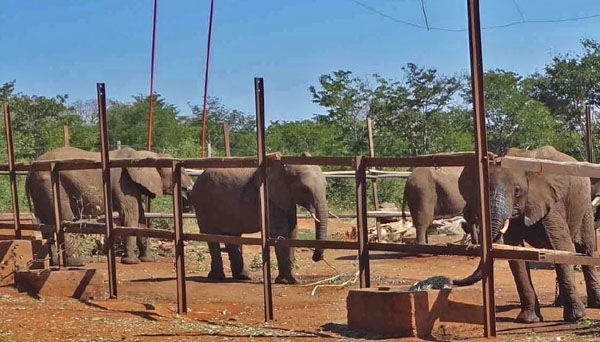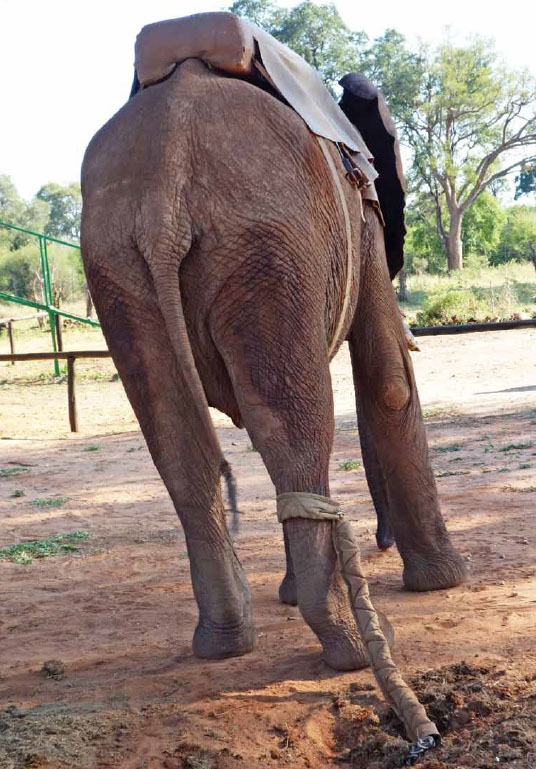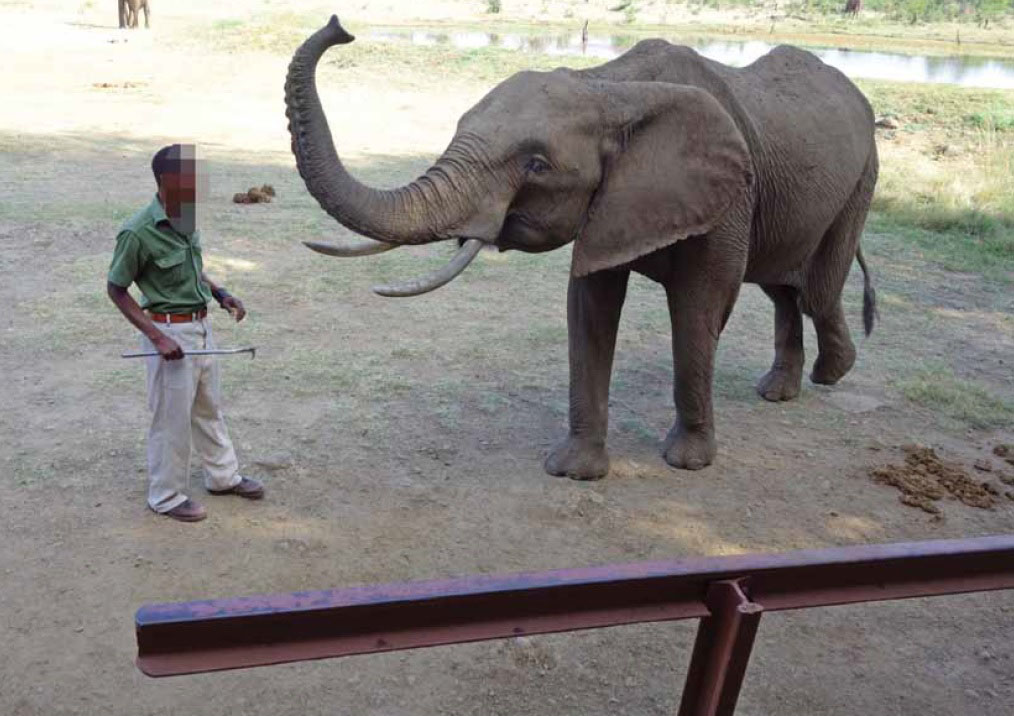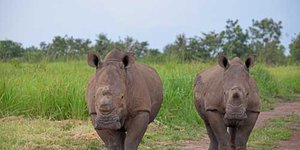Like this article?
Go on, give it a kudu!

Published on October 25 2016
Written by:
Elizabeth Hogan
3457 views
Young elephants can be sold for as much to $60,000
At least 39 commercial elephant venues, holding at least 215 captive elephants, are presently in operation across Southern Africa
At least 25 of these venues–many known as elephant parks–offer elephant rides
Of these, at least seven also force their captive elephants to do tricks for visiting tourists Al
l tourist attractions that breed elephants for commercial purposes and promote direct contact with elephants, including rides, shows or tricks, should be avoided.
Most tourists sign up for experiences with elephants because they love wild animals and don’t know about the cruelty behind the rides, tricks and photo opportunities. World Animal Protection realizes that if most people did, they wouldn’t participate. Some venues also market themselves as sanctuaries but don’t let them take you for a ride, literally!
Captive elephants used in profit-making entertainment rides can endure horrendous captive conditions for decades. These include chaining and close confinement, loneliness and isolation from other elephants—with whom they would naturally form bonds—and deprivation of food and water.
In order to make elephants submit to rides and other human interactions, they are forced through a horrific training process known as "the crush." A bullhook is used to inflict pain to ‘teach’ an elephant to do tricks. The crush—referring to the literal breaking of the spirit of the elephant—involves extreme physical restraints, inflicting severe pain, and withholding food and water. And the cruelty does not end after the crush. When not performing or used for rides most elephants are kept in chains, unable to socialize, and young are elephants are often separated from their mothers.
Elephants are highly intelligent, emotional and social animals; they have complex multi-tiered social systems, close family bonds and show empathy[1]. Females live in strongly-bonded matriarchal herds and care for their young together[2]

This is hugely damaging to their physical and psychological well-being. By the time tourists come to ride an elephant, it may look at peace - but the sad reality is that this elephant has suffered extreme physical cruelty and their spirit has been broken.
Young elephants can be sold for as much to $60,000[3]. This is driven by the tourism industry’s growing demands and has led to poaching for the tourism industry and of breeding captive elephants for profit. Consequently, wild populations may be put under even more strain. And commercial venues using elephants for entertainment do not help to boost wild populations. This is because elephants are extremely difficult and costly to be responsibly and safely released into the wild[4].
When carried out ethically, tourism can bring in vital income for local communities and national economies and can help protect wild animals like elephants. In South Africa alone, there is a network of 400 protected land areas[5]. Many have wild elephants that tourists can observe in their natural habitat. Ethical wildlife tourists can help end the unnecessary suffering of elephants by refusing to visit the parks that offer rides, shows and tricks. Instead, they can choose to see elephants in wild protected areas. Genuine elephant sanctuaries, such as the David Sheldrick Wildlife Trust, have animal welfare at the core of what they do. They will not use elephants in performances for tourists or allow the elephants to be ridden. Genuine sanctuaries show that neither cruelty nor harsh treatment are ever needed to manage the elephants in their care.
All tourist attractions that breed elephants for commercial purposes and promote direct contact with elephants, including rides, shows or tricks, should be avoided.

?Genuine sanctuaries do not offer rides, ‘be-a-mahout’ activities, shows or any other inappropriate public interaction. Elephant-friendly venues, operating according to best possible welfare, will not allow for any direct tourist-elephant interaction.
Elephant-friendly venues aim to provide conditions for elephants to live in a wild or semi-wild environment day and night. This is important to allow for social interaction in natural groupings, adequate movement and natural foraging.
Elephant-friendly venues educate their visitors with the aim to raise awareness of the animal welfare concerns associated with keeping elephants in captivity, including their complex needs and the conservation issues surrounding taking of animals from the wild.
At an elephant-friendly venue, elephants are handled humanely in all situations. Elephant-friendly venues use positive reinforcement whenever possible to manage elephants and to ensure the safety of tourists, caretakers and animals.
?True sanctuaries do not engage in captive breeding, as this diverts valuable resources and space away from rescuing other elephants in genuine need.
Elephants belong in the wild. Help stop the capture, cruelty, and exploitation of elephants across southern Africa – don’t visit venues that offer rides or shows.
For More Information, you can read the full report by World Animal Protection: http://www.worldanimalprotection.us.org/sites/default/files/us_files/elephant_ride_report_a4.pdf
Or visit: https://www.worldanimalprotection.us.org/wildlife-not-entertainers
[1] Byrne, R., Lee, P. C., Njiraini, N., Poole, J. H., Sayialel, K., Sayialel, S., & Moss, C. J. (2008). Do elephants show empathy? Journal of Consciousness Studies, 15(10-11), 204-225
[2] Poole, J., (1996). The African Elephant. In Kangwana, K. ed. Studying Elephants African Wildlife Foundation Technical Handbook Series 7. Nairobi: African Wildlife Foundation. Pp 1-8.
[3] Vaughan, A. (2015). Zimbabwe defends plan to sell 27 elephants to China. The Guardian. February 9th 2015. [ONLINE] Available at: http://www.theguardian.com/environment/2015/feb/09/zimbabwe-defends-plan-to-sell-27-elephants-to-china. [Accessed 3rd September 2015]
[4] BIAZA (date unknown). Reintroduction. [ONLINE] Available at:http://www.biaza.org.uk/conservation/in-situ-conservation/reintroduction/ [Accessed 07th July 2015]
[5] Paterson, A. R (2010). Legal Framework for Protected Areas: South Africa. Gland, Suiza: IUCN (2010).
Has been on: 0 safaris
Part of the excitement of visiting Africa is experiencing the exotic wildlife. No one who has dreamed of seeing an elephant up close would want to see the animal harmed. Unfortunately, that is what has happened to every single elephant that gives a human a ride or performs in a show. You can learn more (and see our film!) here: https://www.worldanimalprotection.org/news/elephants-are-wildlife-not-entertainers World Animal Protection believes that wild animals do not belong in captivity for the purpose of entertaining humans - especially given the inherent cruelty in captivity and "training". Hundreds of thousands of wild animals across the world are taken away from natural habitats, forced into captivity and subjected to abuse, both mentally and physically, in the name of entertainment and profit. We're calling for tourists and tour operators worldwide to work with us to keep wild animals in the wild where they belong. Appreciating elephants in their natural habitat is a way to enjoy African wildlife without supporting the industry that subjects them to horrific cruelty. Your choices on holiday have the power to reduce demand for cruel attractions and save animal lives. Read our report and join our action to put an end to captivity and torture:https://www.worldanimalprotection.org/wildlife-not-entertainers
© Your African Safari Ltd, All rights reserved.
Your African Safari is a safari-planning and safari review site. It was created to help support a healthy African wildlife population. All reviews are vetted before being approved and only ethical tours are published

Garamba National Park—an anchor of hope in the Democratic Republic of Congo
Published on January 09 2025
By: R.W.

Namibia imposes new visa requirements
Published on July 25 2024
By: yourafricansafari.com

Do I really need travel insurance or travel protection for my safari?
Published on July 30 2024
By: yourafricansafari.com